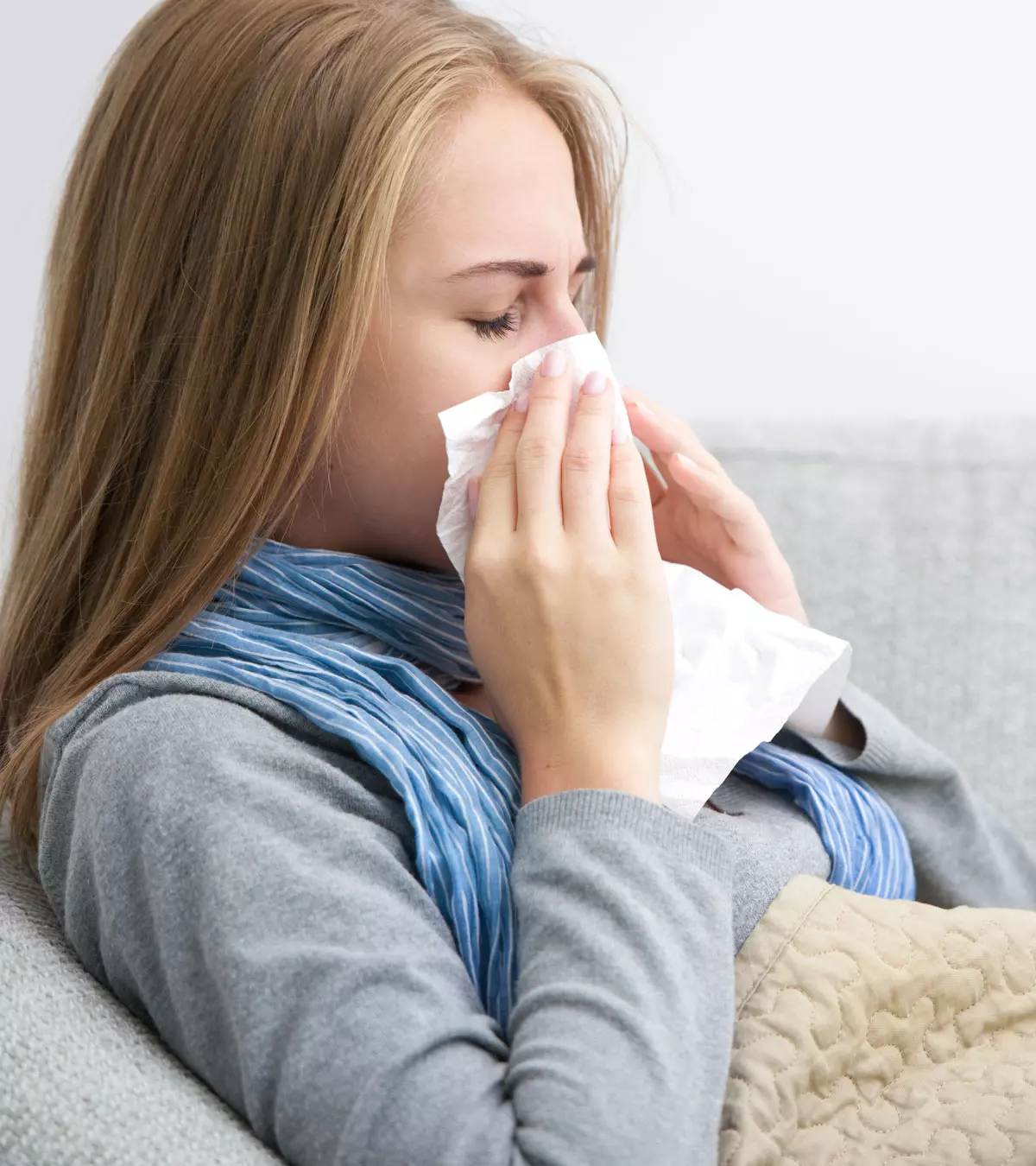

Image: Shutterstock

Flu in teens can be a self-limiting infection. Usually, severe illness is seen in teens with weakened immune systems and chronic illnesses (1). It is also called influenza or grippe and is a common viral illness that can be seen throughout the year. Flu symptoms in teens are similar to adults, including fever, throat irritation, cough, and headache. These may last up to 10 days in most teens. Although it makes you feel sick, it may not cause any complications in most cases. Read on to know the causes, signs, treatment, and prevention of flu in teens.
Causes Of Flu In Teens
Human influenza virus types A and B are responsible for the seasonal flu epidemics. The type C influenza virus may cause mild illness but not human flu epidemics. Type D viruses cause diseases in cattle and are not known to infect humans (2).
H1N1 (Spanish or swine flu), H2N2 (Asian flu), H3N2 (Hong Kong flu), and H5N1(bird flu) are a few of the subtypes of influenza A viruses that cause illness in humans (3).
Influenza is spread through air or from a contaminated surface or object. The person who is infected may transmit the flu virus to a healthy person through respiratory droplets while coughing, sneezing, or talking. Touching the eyes, nose, or mouth with unwashed hands can often cause flu (4).
Flu can be contagious from the day before the symptoms develop or at the onset of symptoms up to five days. Immunocompromised people and children can be contagious for more days than others (5).
Although antibodies are present in the body from past influenza or vaccination, constant changes in the virus can result in the development of new strains each season. Due to this, an annual influenza vaccine shot is recommended (6).
Note: Although the symptoms of common cold and flu are similar, common cold is caused by viruses, including rhinoviruses, parainfluenza virus, respiratory syncytial viruses, etc., and it is less severe. (7).
Flu Symptoms In Teens
Runny nose and sneezing can be the initial symptoms of flu. A few may have throat pain or sore throat, and the beginning can be similar to a common cold. However, flu can be more severe, and the onset of symptoms can be more rapid than cold.
The following are some of the signs and symptoms of flu (8):
- Fever of more than 100.4°F
- Muscle aches or body aches
- Sneezing
- Sweating
- Chills
- Headache
- Cough
- Fatigue
- Congested (stuffy) or runny nose
- Sore throat
- Nausea
- Vomiting
- Diarrhea
- Loss of smell and taste
- General uneasiness
Cough can be persistent and dry during flu in most people. In rare cases, nausea, vomiting, and diarrhea can occur in flu. Although the symptoms are similar, common cold is a mild disease and may not result in complications, whereas influenza can lead to complications (9).
Risks And Complication Of Flu In Teens
The following factors may increase the risk of complications due to flu (10):
- Poor and crowded living conditions
- Cancer treatments, blood cancer, HIV infection, or any other medical conditions or medications that lower immunity
- Chronic diseases, such as asthma, heart problems, neurological disorders, and respiratory diseases
- Obesity
- Pregnancy
- Endocrine disorders
- Metabolic disorders
- Liver or kidney problems
Complications
Flu may not cause severe complications in most teens. Usually, your teen may feel better in a week or two without any adverse effects. However, the following complications may occur rarely in a few teens (11):
- Exacerbation of asthma
- Ear infection
- Sinus infection
- Bronchitis
- Pneumonia (secondary bacterial infections)
- Cardiac problems
- Myocarditis
- Encephalitis
- Myositis (inflammation of the muscle tissue)
Pneumonia is the most common complication of flu; if left untreated, it can be fatal, especially in people with chronic illness or low immunity.
Diagnosis Of Flu
Your teen’s doctor may not order any tests to diagnose flu since the results do not have a role in treatment. It can be diagnosed based on symptoms, and the doctor may order tests during an outbreak of respiratory infections to confirm the flu.
Nasal or throat swabs are taken for the tests. The most common flu tests are (12):
- Rapid influenza diagnostic tests (RIDTs): These are taken to detect viral antigens, and the results are available in 10 to 15 minutes.
- Rapid molecular assays: These tests are taken to identify the viral genetic material, and the results are obtained in 15 to 20 minutes. These are more accurate than RID tests. However these are rarely necessary.
Treating Flu In Teens
Flu can be cured with adequate hydration and rest in most teens. However, teens who have severe infections or increased chances of complications should see a doctor. The doctor may prescribe antivirals such as (13):
- Tamiflu (Oseltamivir)
- Relenza (Zanamivir)
- Rapivab (Peramivir)
- Xofluza (Baloxavir)
These medications may help reduce the severity, duration, and complications of influenza in teens. Tamiflu is taken orally, whereas Relenza is administered in inhaler devices. Relenza is often prescribed for teens with chronic respiratory diseases.
These medications may result in side effects, such as nausea or vomiting. Drugs such as amantadine and flumadine (rimantadine) are no longer advised.
Home Remedies For Flu In Teens
The following home remedies and precautions may help ease flu symptoms (14):
- Stay hydrated: You may ask your teen to drink adequate amount of water to avoid dehydration. You may also give them juices and soups.
- Take rest: Let them sleep well and refrainain from sports until the symptoms get better.
- Pain medications: Over-the-counter pain relievers such as acetaminophen (Tylenol) or ibuprofen (Motrin IB) may help relieve pain.
Note:
Do not give aspirin to children with flu symptoms since it may cause Reye syndrome (15).
Prevention Of Flu In Teens
The annual influenza vaccine is recommended by the Centers for Disease Control and Prevention (CDC) for all who are older than six months. The vaccine can give immunity against three to four strains of flu virus that is expected to cause seasonal flu in the year. This is available as a nasal spray or injection, depending on your country’s guidelines. However, if your teen has asthma, wheezing, or compromised immune conditions, you may mention it to the doctor before vaccination.
Some flu vaccines are made using egg-based technology, and they contain small quantities of egg proteins (ovalbumin). If your teen has an egg allergy or history of skin rashes after eating eggs, you should inform the doctor. However, cases of mild allergy may not pose a risk. Those who had severe allergic reactions to eggs should receive the vaccination in hospital setting so that any allergic reactions can be managed on time (16) (17).
The following measures may help prevent flu in teens (18):
- Washing hands frequently using soap and water
- Using alcohol-based sanitizers to clean hands often
- Covering the mouth or nose while sneezing or coughing
- Avoiding crowded places during the flu season
If your teen has flu symptoms, staying at home for 24 hours until the symptoms are revealed can reduce the chance of infecting others. While caring for your teen with flu at home, follow these hygiene measures, and avoid close contact with them to protect yourself.
When To See The Doctor
Flu can be self-limiting, and most people do not require consultation with a doctor. If your teen has any conditions such as asthma or low immunity, you may seek medical care. You may contact your healthcare provider if the symptoms are severe and persist longer than usual or if you get any indications of complications.Although flu symptoms can be like coronavirus infection, you need to seek medical care only if there is close contact with an infected person and if you travel to or live in endemic areas. However, if there is an alert to seek medical care for flu symptoms in your area, visit the doctor without delay.
Early diagnosis and treatment with antivirals can reduce the severity and complications of influenza as well as other infections.
High-risk groups are advised to take antivirals for flu immediately if they have symptoms. Although the antivirals and hygiene measures help fight the flu, the annual influenza vaccine is the best way to prevent flu.
Frequently Asked Questions
1. Does the flu affect the immune system of teens?
Yes, the flu can negatively impact the immune system. Studies report that the influenza virus suppresses the innate immune system and may also affect the adaptive immune responses by infecting and neutralizing the activated lymphocytes (20).
2. What should I not eat during the flu?
Foods that are best avoided if you have the flu include (21)
- Fizzy, sugary, or caffeinated beverages
- Junk food
- Grains that are difficult to digest
3. Can I get the flu twice?
Yes, you may get the flu twice during the same flu season. Influenza A and influenza B are the two main types of influenza virus, and contracting one does not provide protection from the other. In simple terms, if you got infected with influenza A, you may also get an influenza B infection later (22).
A high fever, headache, and body pain are common flu symptoms in teens. Although these symptoms usually go away within a week or two, complications such as bronchitis or encephalitis might be seen if they persist. Ensure that your child is hydrated enough and takes proper rest to aid in the speedy recovery process. Vaccinating your teen against the influenza virus, teaching them to wash their hand and mouth frequently, and maintaining proper hygienic conditions can help prevent it (19).
References
1. People at High Risk For Flu Complications; Centers for Disease Control and Prevention
2. Understanding Influenza Viruses; Centers for Disease Control and Prevention
3. Types of Influenza Viruses; Centers for Disease Control and Prevention
4. All About the Flu and How to Prevent It; National Institutes of Health (NIH)
5. How Flu Spreads; Centers for Disease Control and Prevention
6. How the Flu Virus Can Change: “Drift” and “Shift”; Centers for Disease Control and Prevention
7. Common Colds: Protect Yourself and Others; Centers for Disease Control and Prevention
8. Key Facts About Influenza (Flu); Centers for Disease Control and Prevention
9. Cold Versus Flu; Centers for Disease Control and Prevention
10. High-risk Groups For Flu Complications; Marshfield Clinic Health System
11. Flu; U.S. National Library of Medicine
12. Diagnosing Flu; Centers for Disease Control and Prevention
13. What You Should Know About Flu Antiviral Drugs; Centers for Disease Control and Prevention
14. Caring for Someone Sick; Centers for Disease Control and Prevention
15. Anthony I. Beutler, et al.; Aspirin Use in Children for Fever or Viral Syndromes; The American Academy of Family Physicians (2009).
16. Key Facts About Seasonal Flu Vaccine; Centers for Disease Control and Prevention
17. December 2018: Have You and Your Teen Gotten the Flu Shot?; U.S. Department of Health & Human Services (HHS)
18. Influenza (Flu) in Children; Johns Hopkins Medicine
19. How Is Pandemic Flu Different from Seasonal Flu?; Centers for Disease Control and Prevention
20. Caitlin D. Bohannon et al.;Influenza Virus Infects and Depletes Activated Adaptive Immune Responders; Wiley Online Library (2025)
21. Foods to avoid when you have the flu; The Ohio State University
22. What to do to keep from getting the flu again? The Ohio State University, Wexner Medical Center
Community Experiences
Join the conversation and become a part of our nurturing community! Share your stories, experiences, and insights to connect with fellow parents.
Read full bio of Dr. Shashidhar A
Read full bio of Dr Bisny T. Joseph














